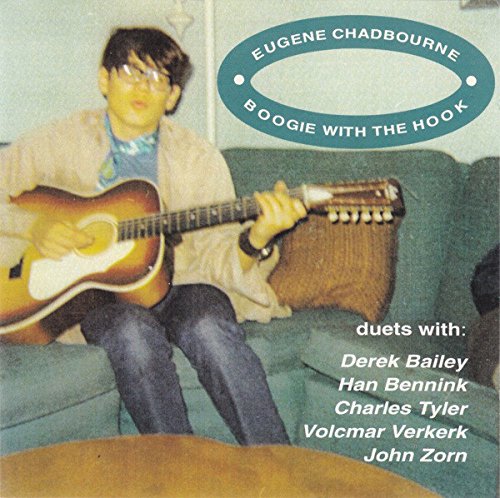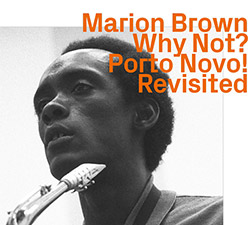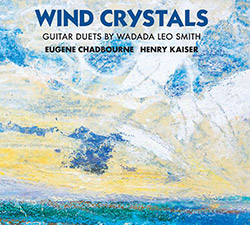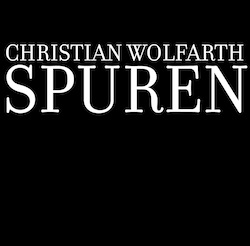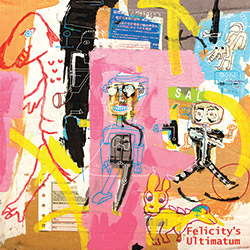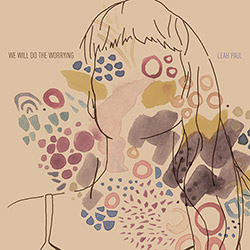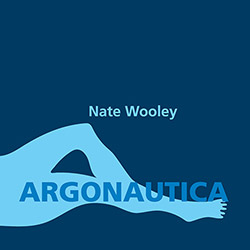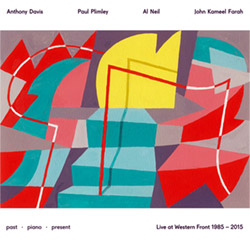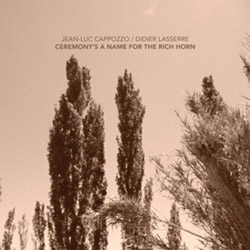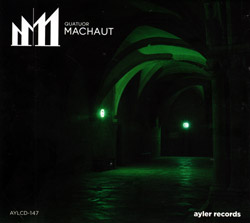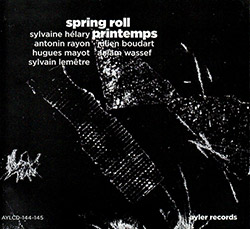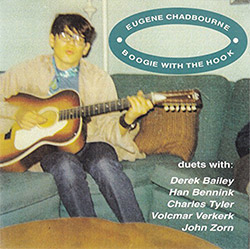
Two decades of duets recorded from New York City to The Netherlands between eccentric free country improviser and vocalist Euguene Chadbourne on guitar and banjo, with free improv masters John Zorn, Derek Bailey, Han Bennink, Volcmar Verkerk, and Charles Tyler.
Save $1.50
Out of Stock
Quantity in Basket: None
Log In to use our Wish List
Shipping Weight: 4.00 units
Sample The Album:
Eugene Chadbourne-guitar, banjo
Derek Bailey-guitar
Han Bennink-percussion, auto harp
Charles Tyler-baritone saxophone, clarinet
Volcmar Verkerk-guitar, banjo
John Zorn-saxophones, clarinet, game calls
Click an artist name above to see in-stock items for that artist.
UPC: 5024792024223
Label: Leo Records
Catalog ID: LEOR242.2
Squidco Product Code: 22462
Format: CD
Condition: New
Released: 1996
Country: UK
Packaging: Jewel Case
Track 1 and 4 recorded in various Dutch locations, 1990.
Track 2 and 3 recorded in Den Haag 1995.
Track 5 recorded in New York City, 1977.
Track 6 recorded in Amsterdam 1996.
Track 7 recorded in New York City, 1980.
"This record of zany duets is among Eugene Chadbourne's wildest and dearest recordings, featuring selections from over two decades. These duets with Han Bennink, Derek Bailey, the late Charles Tyler, John Zorn, and others, showcase the woolliest side of Chadbourne's woolly playing and his dodging all over the musical and historical map.
The first track is an acoustic version of John Lee Hooker's "Whiskey and Women," accompanied by Bennink playing a pizza box with brushes, a giant bass autoharp played with drumsticks, and, of course, a drum kit. Chadbourne plays the tune straight (for him) at the beginning, even getting all the words right, but then veers off his National Steel onto a "communist" five-string banjo, and he and Bennink run the course, carrying the off-meter 12-bar blues as off-world as they can go, laughing all the way.
Next up is Derek Bailey and Chadbourne on two selections. The first, "In Search of Carl La Fong," is filled with commentary by both men. Bailey's guitar and Chadbourne's electric rake and electrified banjo trip and slip all over one another here, with respect and purpose, of course, but nonetheless sloppily. It's a rousing series of musical maneuvers at over nine minutes.
When Bennink and Chadbourne reunite, it's a darker, more percussive show: feedback from rhythm and lead instruments becomes the M.O. by which they create something resembling a melodic idea from the wreckage. And it's quite beautiful, as Gershwin's songbook comes through as the melodic framework for the improvisation.
The work with Tyler, "In Between Comme C and Come Saw," is balls-out space improv, though the master saxist uses his baritone in striking ways not usually becoming of the instrument itself. It becomes a kind of clogged, scraped, razor-voiced bell in the tower of noise. Tyler draws microtones out of the instrument we have literally never heard before, and Chadbourne is content to lend idiomatic support to this gracious unfolding.
"Red Lightning, Pt. 1" by Chadbourne and Zorn is hilarious. This is more in line with Zorn's Classic Guide to Strategy than anything else, in both spirit and execution -- though there are no duck calls credited on this recording. There is space here, sometimes long periods of it, where what is happening between the pair is not readily apparent; there is plenty of trickery and tomfoolery as well, leaving the listener guffawing in more than a few places.
As usual, there is only one problem with the record: the sound quality is barely above, and perhaps not even above, an audience recording of a bootleg tape. In places, the stereo has to be turned up over halfway just to hear the guitar. Leo Feigin's taste and vision may be admirable, but his execution of projects can leave a lot to be desired."-Thom Jurek, All Music
Get additional information at All Music
Artist Biographies
• Show Bio for Eugene Chadbourne "A seemingly endless -- and endlessly eclectic -- series of releases made the innovative guitarist Eugene Chadbourne one of the underground community's most well-known and well-regarded eccentrics. Born January 4, 1954 in Mount Vernon, NY, Chadbourne was raised in Boulder, CO, by his mother, a refugee of the Nazi death camps. At the age of 11, the Beatles inspired him to learn guitar; later exposure to Jimi Hendrix prompted him to begin experimenting with distortion pedals and fuzzboxes. Ultimately, however, he became dissatisfied with the conventions of rock and pop, and traded in his electric guitar for an acoustic one, on which he began to learn to play bottleneck blues. Perhaps Chadbourne's most significant formative discovery was jazz; initially drawn to John Coltrane and Roland Kirk, he later became an acolyte of the avant excursions of Derek Bailey and Anthony Braxton. Despite the huge influence music exerted over his life, however, Chadbourne first studied to become a journalist, but his career was derailed when he fled to Canada rather than fight in Vietnam; only President Jimmy Carter's declaration of amnesty for conscientious objectors allowed the vociferously left-wing Chadbourne to return to the U.S. in 1976, at which time he plunged headlong into the New York downtown music scene. After releasing his 1976 debut, Solo Acoustic Guitar, he began collaborating on purely improvisational music with the visionary saxophonist John Zorn and the acclaimed guitarist Henry Kaiser. Quickly, Chadbourne carved out a singular style, comprised of equal parts protest music, free improvisation, and avant-garde jazz, topped off with his absurd, squeaky vocals. A complete list of Chadbourne's countless subsequent collaborations and genre workouts is far too lengthy and detailed to exhaustively document, although in the early '80s he garnered some of his first significant attention as the frontman of Shockabilly, a demented rockabilly revisionist outfit which also featured the well-known producer Kramer. Following the group's breakup, Chadbourne turned to his own idiosyncratic brand of country and folk, accurately dubbed LSD C&W on a 1987 release, the same year he joined the members of Camper Van Beethoven for a one-off covers project. In addition, he recorded with artists ranging from Fred Frith and Elliott Sharp to Evan Johns and Jimmy Carl Black, the original drummer in the Mothers of Invention; in between, he continued exploring unique styles inspired by music from the four corners of the globe, all the while issuing a seemingly innumerable string of records, most of them on his own Parachute label." ^ Hide Bio for Eugene Chadbourne • Show Bio for Derek Bailey "Derek Bailey (29 January 1930 - 25 December 2005) was an English avant-garde guitarist and leading figure in the free improvisation movement. Bailey was born in Sheffield, England. A third-generation musician, he began playing the guitar at the age of ten, initially studying music with his teacher and Sheffield City organist C. H. C. Biltcliffe, an experience that he did not enjoy, and guitar with his uncle George Wing and John Duarte. As an adult he worked as a guitarist and session musician in clubs, radio, dance hall bands, and so on, playing with many performers including Morecambe and Wise, Gracie Fields, Bob Monkhouse and Kathy Kirby, and on television programs such as Opportunity Knocks. Bailey's earliest foray into 'what could be called free improvised music' was in 1953 with two other guitarists in their shared flat in Glasgow. He was also part of a Sheffield-based trio founded in 1963 with Tony Oxley and Gavin Bryars called "Joseph Holbrooke" (named after the composer, whose work they never actually played). Although originally performing relatively "conventional" modal, harmonic jazz this group became increasingly free in direction. Bailey moved to London in 1966, frequenting the Little Theatre Club run by drummer John Stevens. Here he met many other like-minded musicians, such as saxophonist Evan Parker, trumpet player Kenny Wheeler and double bass player Dave Holland. These players often collaborated under the umbrella name of the Spontaneous Music Ensemble, recording the seminal album Karyobin for Island Records in 1968. In this year Bailey also formed the Music Improvisation Company with Parker, percussionist Jamie Muir and Hugh Davies on homemade electronics, a project that continued until 1971. He was also a member of the Jazz Composer's Orchestra and Iskra 1903, a trio with double-bass player Barry Guy and tromboneist Paul Rutherford that was named after a newspaper published by the Russian revolutionary Vladimir Lenin. In 1970, Bailey founded the record label Incus with Tony Oxley, Evan Parker and Michael Walters. It proved influential as the first musician-owned independent label in the UK. Oxley and Walters left early on; Parker and Bailey continued as co-directors until the mid-1980s, when friction between the men led to Parker's departure. Bailey continued the label with his partner Karen Brookman until his death in 2005[citation needed]. Along with a number of other musicians, Bailey was a co-founder of Musics magazine in 1975. This was described as "an impromental experivisation arts magazine" and circulated through a network of like-minded record shops, arguably becoming one of the most significant jazz publications of the second half of the 1970s, and instrumental in the foundation of the London Musicians Collective. 1976 saw Bailey instigate Company, an ever-changing collection of like-minded improvisors, which at various times has included Anthony Braxton, Tristan Honsinger, Misha Mengelberg, Lol Coxhill, Fred Frith, Steve Beresford, Steve Lacy, Johnny Dyani, Leo Smith, Han Bennink, Eugene Chadbourne, Henry Kaiser, John Zorn, Buckethead and many others. Company Week, an annual week-long free improvisational festival organised by Bailey, ran until 1994. In 1980, he wrote the book Improvisation: Its Nature and Practice. This was adapted by UK's Channel 4 into a four-part TV series in the early '90s, edited and narrated by Bailey. Bailey died in London on Christmas Day, 2005. He had been suffering from motor neurone disease." ^ Hide Bio for Derek Bailey • Show Bio for Han Bennink "Drummer and multi-instrumentalist Han Bennink was born in Zaandam near Amsterdam in 1942. His first percussion instrument was a kitchen chair. Later his father, an orchestra percussionist, supplied him with a more conventional outfit, but Han never lost his taste for coaxing sounds from unlikely objects he finds backstage at concerts. He is still very fond of playing chairs. In Holland in the 1960s, Bennink was quickly recognized as an uncommonly versatile drummer. As a hard swinger in the tradition of his hero Kenny Clarke, he accompanied touring American jazz stars, including Sonny Rollins, Ben Webster, Wes Montgomery, Johnny Griffin, Eric Dolphy and Dexter Gordon. He is heard with Gordon on the 1969 album "Live at Amsterdam Paradiso" (on the Affinity label) and with Dolphy on 1964s "Last Date" (PolyGram). At the same time, Bennink participated in the creation of a European improvised music which began to evolve a new identity, apart from its jazz roots. With fellow Dutch pioneers, pianist Misha Mengelberg and saxophonist Willem Breuker, he founded the musicians collective Instant Composers Pool in 1967. Bennink anchored various bands led by Mengelberg or Breuker, and appeared in their comic music-theater productions. Bennink attended art school in the 1960s, and is also a successful visual artist in several media, often constructing sculpture from found objects, which may include broken drum heads and sticks. He has designed the covers for many LPs and CDs on which he appears. Bennink is represented by Amsterdam's Galerie Espace, and has been the subject of several one-man shows, including one at the Gemeente Museum in the Hague in 1995. In 1966, Bennink played the US's Newport Jazz Festival with the Mengelberg quartet. From the late 1960s through the '70s Bennink collaborated frequently with Danish, German, English and Belgian musicians, notably saxophonists John Tchicai and Peter Broetzmann, guitarist Derek Bailey and pianist Fred van Hove. Bennink, Broetzmann and van Hove had a longstanding trio well documented on FMP Records. There Bennink also showcased his talents on clarinet, trombone, soprano saxophone and many other instruments, also featured in a series of solo albums he began in 1971. Bennink's many recordings from the 1980s include sessions with Mengelberg's ICP Orchestra (where he remains), South African bassist Harry Miller, soprano saxophonist Steve Lacy, trombonists Roswell Rudd and George Lewis, and big-bandleaders Sean Bergin and Andy Sheppard. From 1988 to'98 Bennink's main vehicle was Clusone 3, with saxophonist and clarinetist Michael Moore and cellist Ernst Reijseger, a band noted for its free-wheeling mix of swinging jazz standards, wide-open improvising, and tender ballads. Clusone played Europe and North America, West Africa, China, Vietnam and Australia, and recorded five CDs for Gramavision, hat Art and Ramboy. Nowadays he is frequently heard with tenor saxophonist Tobias Delius's quartet and in a trio with pianist/keyboardist Cor Fuhler and bassist Wilbert de Joode, and he still collaborates occasionally with jazz luminaries such as Johnny Griffin, Von Freeman and Ray Anderson. A conspicuous feature of Bennink's musical life since the 1960s is the spontaneous duo concert with musicians of many nationalities and musical inclinations; in the '90s he recorded in duo with among others pianists Mengelberg, Irene Schweizer and Myra Melford, guitarist Eugene Chadbourne, trumpeter Dave Douglas and tenor saxophonist Ellery Eskelin. Since 2008 Han Bennink has his own Han Bennink Trio consisting of Han Bennink, Joachim Badenhorst on clarinet and Simon Toldam on piano." ^ Hide Bio for Han Bennink • Show Bio for Charles Tyler "Charles Lacy Tyler (July 20, 1941 - June 27, 1992) was an American jazz baritone saxophonist. He also played alto saxophone and clarinet. Tyler was born in Cadiz, Kentucky, and spent his childhood years in Indianapolis. He played piano as a child and clarinet at 7, before switching to alto in his early teens, and finally baritone saxophone. During the summers, he visited Chicago, New York City and Cleveland, Ohio, where he met the young tenor saxophonist Albert Ayler at age 14. After sering in the army from 1957-1959, Tyler relocated to Cleveland in 1960 and began playing with Ayler, conmuting between New York and Cleveland. During that period played with Ornette Coleman and Sunny Murray. In 1965 Tyler recorded Bells and Spirits Rejoice with Alyer's group. He recorded his first album as leader the following year for ESP-Disk. He returned to Indianapolis to study with David Baker at Indiana University between 1967 and 1968, recording a second album for ESP, Eastern Man Alone. In 1968, he transferred to the University of California, Berkeley to study and teach. In Los Angeles, he worked with Arthur Blythe, Bobby Bradford, and David Murray. He moved back to New York in 1974, leading his own groups with Blythe, trumpeter Earl Cross, drummer Steve Reid and others, recording the album Voyage from Jericho on Tyler's own Akba label. In 1975, Tyler enrolled at Columbia University and made an extensive tour of Scandinavia, releasing his second Akba album Live in Europe. In 1976, he performed the piece "Saga of the Outlaws" at Sam Rivers's Studio Rivbea, released two years later on Nessa Records. During that period he played as a sideman or co-leader with Steve Reid, Cecil Taylor and Billy Bang. In 1982, during a European tour with Sun Ra's Orchestra, he relocated to Denmark, and in 1985 he moved to France, recording with other expatriates like Khan Jamal in Copenhagen and Steve Lacy in Paris. Tyler died in Toulon, France of heart failure in June 1992." ^ Hide Bio for Charles Tyler • Show Bio for John Zorn "John Zorn (born September 2, 1953) is an American composer, arranger, producer, saxophonist, and multi-instrumentalist with hundreds of album credits as performer, composer, and producer across a variety of genres including jazz, rock, hardcore, classical, surf, metal, klezmer, soundtrack, ambient, and improvised music. He incorporates diverse styles in his compositions which he identifies as avant-garde or experimental. Zorn was described by Down Beat as "one of our most important composers". Zorn established himself within the New York City downtown music movement in the mid-1970s performing with musicians across the sonic spectrum and developing experimental methods of composing new music. After releasing albums on several independent US and European labels, Zorn signed with Elektra Nonesuch and received wide acclaim with the release of The Big Gundown, an album reworking the compositions of Ennio Morricone. He attracted further attention worldwide with the release of Spillane in 1987, and Naked City in 1989. After spending almost a decade travelling between Japan and the US he made New York his permanent base and established his own record label, Tzadik, in the mid-1990s. Tzadik enabled Zorn to maintain independence from the mainstream music industry and ensured the continued availability of his growing catalog of recordings, allowing him to prolifically record and release new material, issuing several new albums each year, as well as promoting the work of many other musicians. Zorn has led the hardcore bands Naked City and Painkiller, the klezmer/free jazz-influenced quartet Masada, composed over 600 pieces as part of the Masada Songbooks that have been performed by an array of groups, composed concert music for classical ensembles and orchestras, and produced music for opera, sound installations, film and documentary. Zorn has undertaken many tours of Europe, Asia, and the Middle East, often performing at festivals with many other musicians and ensembles that perform his diverse output. Zorn's compositions cross many genres and he has stated "All the various styles are organically connected to one another. I'm an additive person-the entire storehouse of my knowledge informs everything I do. People are so obsessed with the surface that they can't see the connections, but they are there." For Zorn "Composing is more than just imagining music-it's knowing how to communicate it to musicians. And you don't give an improviser music that's completely written out, or ask a classical musician to improvise. I'm interested in speaking to musicians in their own languages, on their own terms, and in bringing out the best in what they do. To challenge them and excite them." " ^ Hide Bio for John Zorn
4/17/2024
Have a better biography or biography source? Please Contact Us so that we can update this biography.
4/17/2024
Have a better biography or biography source? Please Contact Us so that we can update this biography.
4/17/2024
Have a better biography or biography source? Please Contact Us so that we can update this biography.
4/17/2024
Have a better biography or biography source? Please Contact Us so that we can update this biography.
4/17/2024
Have a better biography or biography source? Please Contact Us so that we can update this biography.
Track Listing:
1. Whisky And Women 8:15
2. In Search Of Carl La Fong 8:05
3. Raking A Chance On Love 1:47
4. Untitled 5:13
5. In Between Comme C And Come Saw 13:18
6. The Banjo Duet 14:37
7. Red Lightning Part 1 17:16
Improvised Music
Free Improvisation
European Improvisation and Experimental Forms
NY Downtown & Metropolitan Jazz/Improv
Duo Recordings
Chadbourne. Eugene
Leo Records
Song Based Music
Search for other titles on the label:
Leo Records.


